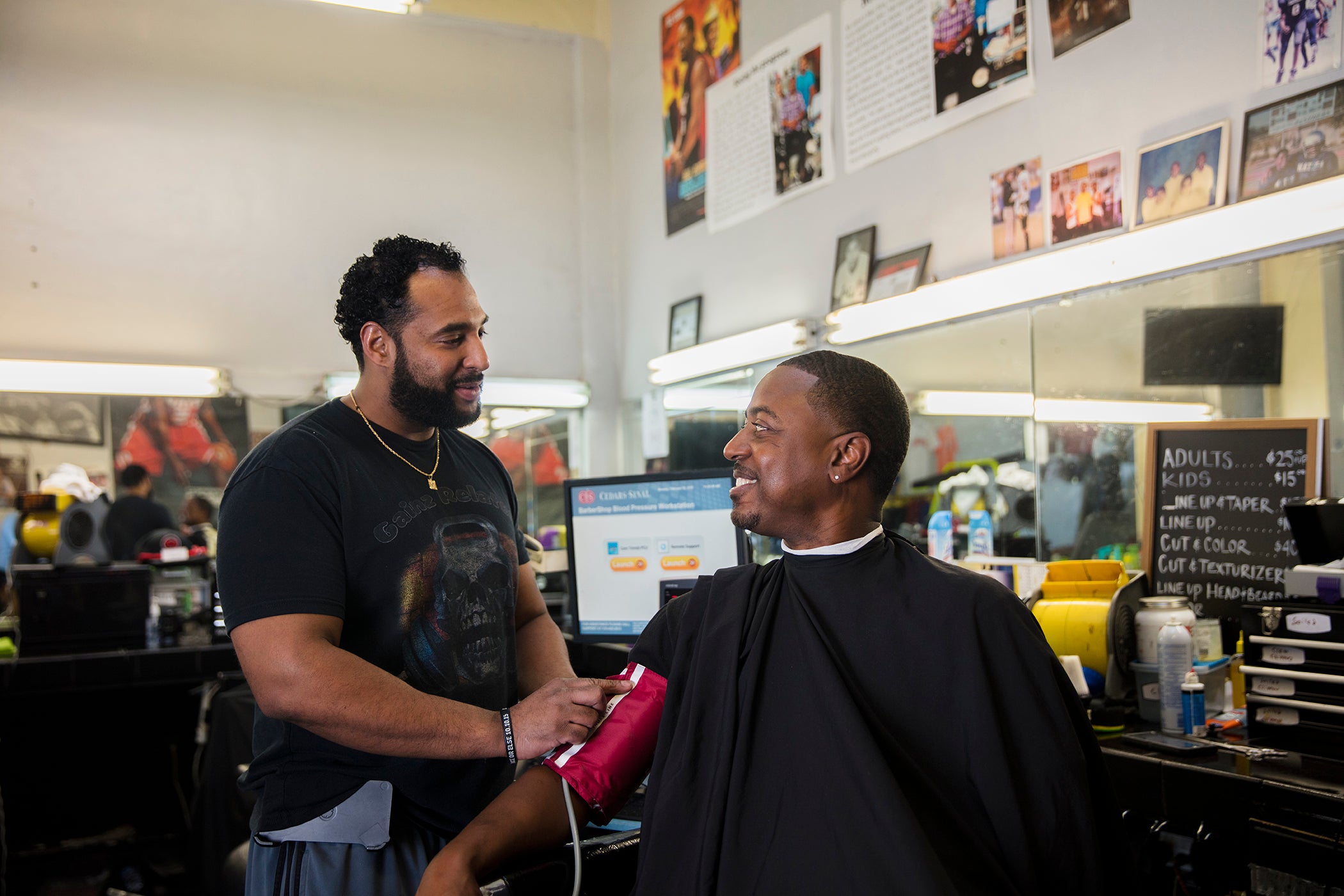Health checks at the barbers help black men cut risk of heart attack and stroke, study finds
‘There is a different level of trust and respect that’s earned when you meet people where they are, instead of in a hospital or clinic’

Your support helps us to tell the story
From reproductive rights to climate change to Big Tech, The Independent is on the ground when the story is developing. Whether it's investigating the financials of Elon Musk's pro-Trump PAC or producing our latest documentary, 'The A Word', which shines a light on the American women fighting for reproductive rights, we know how important it is to parse out the facts from the messaging.
At such a critical moment in US history, we need reporters on the ground. Your donation allows us to keep sending journalists to speak to both sides of the story.
The Independent is trusted by Americans across the entire political spectrum. And unlike many other quality news outlets, we choose not to lock Americans out of our reporting and analysis with paywalls. We believe quality journalism should be available to everyone, paid for by those who can afford it.
Your support makes all the difference.Providing health advice and blood pressure check-ups at barber shops is an effective way to help at-risk black men cut their chances of having a heart attack or stroke, researchers have found.
A group of African American men took part in a trial where trained pharmacists offered health checks while they were getting a trim. Two-thirds managed to reduce their high blood pressure down to healthy levels.
People from African or African Caribbean backgrounds in the UK and US are more likely than other groups to suffer from uncontrolled high blood pressure, and other conditions that increase their risk of dying younger.
Men are at greater risk, partly because they have less interaction with health services.
However, the results of the US trial suggest that providing blood pressure testing / advice away from the hospital and GP surgery can have major benefits.
“When we provide convenient and rigorous medical care to African American men by coming to them – in this case, having pharmacists deliver that care in barbershops – blood pressure can be controlled and lives can be saved,” said Dr Ronald Victor, associate director of the Smidt Heart Institute at Cedars-Sinai Medical Centre
Dr Victor is the lead author of the study, published today in the New England Journal of Medicine (NEJM), which also found a (smaller) benefit to having the barbers, without a pharmacist, promoting blood pressure health advice.
NHS Choices says the risk of high blood pressure also applies to some people of mixed-race African heritage. The exact reasons are unclear, but may be linked to a combination of diet, lifestyle, and differences in how the body stores fat.
In the past week, health watchdog the National Institute for Health and Care Excellence (NICE) recommended that millions more people be put on blood pressure drugs, to cut the burden of heart attacks and strokes.
The NEJM study recruited 319 African American men aged 35 to 79 who were regular customers at one of 52 black-owned barber shops across Los Angeles.
They all had a systolic blood pressure – the number value showing the pressure in their arteries as the heart contracts – above the level at which it begins to pose a serious risk of heart attack and stroke (140mmHg).
The men were randomly assigned to two different groups.
The first group were encouraged by their barbers to have a monthly meeting at the barbershop with a specially trained pharmacist, who could provide medication, monitor blood tests and keep their GP updated.
The second group were encouraged by their barbers to make lifestyle changes and to follow up with their GP about treatment for their high blood pressure.
“It’s the silent killer, and it has cost the lives and health of a lot of good men,” said Eric Muhammad, whose Inglewood shop, A New You Barbershop, participated in the study.
”It’s a no-brainer that black men are at the highest risk of high blood pressure,” he added.
The study showed how family and community networks can be better used in health interventions.
“A big takeaway from this study is to release the fears. We cannot fear what the doctor will tell us,” said Mr Muhammad, who is also a co-author of the study.
The location of the check-ups was seen as key to breaking down these fears.
“There is a different level of trust and respect that’s earned when you meet people where they are, instead of in a hospital or clinic,” said Adair Blyler, a pharmacist who treated patrons while they were in the barbershops.
“The rapport I’ve been able to establish with this group of patients has been unlike any other I’ve had in my professional career.”
This relationship between health professional and patient is also significant in managing long-term conditions like high blood pressure, and one of the reasons the intervention was so successful.
While 11.7 per cent of the men given advice by their barber alone were able to bring their blood pressure into a healthy range in the six-month trial, nearly two- thirds (64 per cent) in the pharmacist group got their blood pressure under control.
“This is a very significant effect for a hypertension trial of any kind,” said Dr Victor.
“Once you have hypertension, it requires a lifetime commitment to taking medications and making lifestyle changes. It is often challenging to get people who need blood pressure medication to take them, even as costs and side effects have gone down over the years.
“With this program, we have been able to overcome that barrier.”
Join our commenting forum
Join thought-provoking conversations, follow other Independent readers and see their replies
Comments